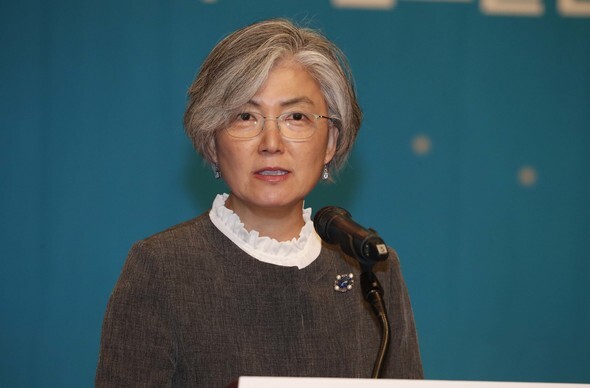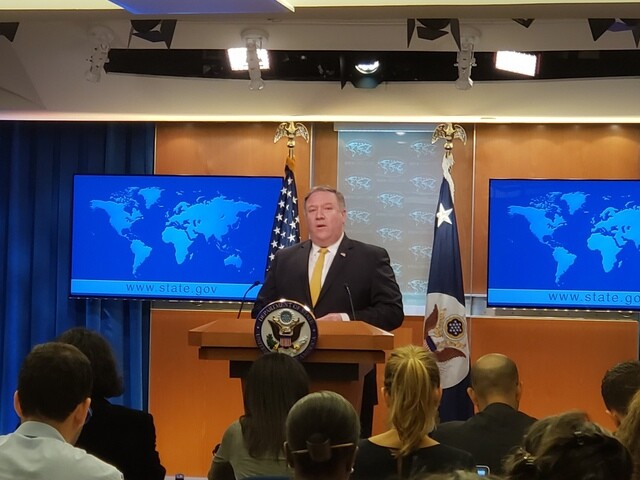hankyoreh
Links to other country sites 다른 나라 사이트 링크
S. Korean foreign minister cautions against US demands for disclosing NK nuclear inventory at the outset

During an interview with the Washington Post on Oct. 3, South Korean Foreign Minister Kang Kyung-wha said that demanding North Korea to provide a list of its nuclear arsenal at the outset would risk leading to a debate about verification that could plunge the negotiations into a deadlock.
Kang’s argument is that it’s inappropriate for the US to demand that the disclosure of the nuclear inventory be the first denuclearization measure it wants the North to take. Kang also once again emphasized the importance of the US’s flexibility and confidence building in relation to its “corresponding measures,” noting the need to approach things differently from the past.
These public remarks were unusual in light of the fact that North Korea and the US have been arguing over whether the nuclear disclosure or end-of-war declaration should come first since their summit on June 12. As it happens, US Secretary of State Mike Pompeo made no mention of North Korea handing over a nuclear list in a press conference held at the State Department in Washington on the same day, shortly before his fourth trip to North Korea on Oct. 7.
Kang’s remarks indicate subtle yet remarkable shift in US positionThe attitude taken by South Korea and the US’s top diplomats represents a subtle yet remarkable shift. This is consistent with the fact that South Korean President Moon Jae-in and North Korean leader Kim Jong-un didn’t mention disclosing a nuclear list in their Pyongyang Joint Declaration in September and unveiled a denuclearization scenario that’s focused on action and specific sites such as Tongchang Village and the Yongbyon nuclear complex.
Kim and Moon reiterated their pledge to make the Korean Peninsula “free from nuclear weapons” while laying out an initial roadmap for denuclearization, including unilateral good-faith measures (“the North will permanently dismantle the Tongchang Village missile engine test site and launch platform under the observation of experts from relevant countries”) and additional measures with strings attached (“the permanent dismantlement of the nuclear facilities in Yongbyon, as the United States takes corresponding measures in accordance with the spirit of the June 12 US-DPRK Joint Statement”).
This language implies a number of points prioritized by the US – the irreversible dismantlement of the North’s nuclear program (“permanent”), inspections (“observation”), a nuclear-free peninsula and the shutdown of the Yongbyon nuclear complex.
Pompeo’s decision to visit North Korea “earlier than expected” (in the words of a senior Blue House official) is prompting hopeful predictions that North Korea and the US have found a way to move beyond their argument over the sequence of the nuclear disclosure and end-of-war declaration, which had been a stumbling block for progress in the two sides’ negotiations.
During her interview with the Washington Post, Kang explained the danger of prioritizing the demand for the nuclear list by bringing up the historical precedent of the collapse of the Six-Party Talks amid growing controversy and mistrust over disclosure and inspections even after the destruction of the cooling tower at the Yongbyon nuclear complex in 2008.

End-of-war declaration to be equivalent of dismantlement of Yongbyon nuclear complex
“I think we will have to see an inventory at some point, but that [same] point can be reached more expeditiously by action and corresponding measures that [give] the two sides sufficient trust,” Kang added.
During a press conference for the South Korean press on Oct. 4, Kang went a step further. After mentioning the “distrust [built up] over 70 years” between North Korea and the US, she advocated the need for “an approach that’s different from methods used in the past,” namely, “denuclearization that moves in sync with confidence building.”
During her remarks, she mentioned “flexibility” seven times, “confidence” three times and “distrust” two times. The context was Kang’s argument that “the US needs to broadly consider the corresponding measures that it can provide” in order to build confidence and assuage distrust.
In the same press conference, Kang also provided some of the details of her “different approach.” This was the point where she said that the “end-of-war declaration” was a corresponding measure that would be equivalent to the permanent dismantlement of the Yongbyon nuclear facility. “We’ve had a lot of deliberations with the US about the end-of-war declaration, and the US has also made some considerable progress in understanding the declaration. In the end, the crux is what the end-of-war declaration will say,” she said. Kang went on to say that “there could also be other corresponding measures in addition to that,” leaving open the possibility for something extra.
North Korea has been making an issue of the end-of-war declaration and the sanctions in the Rodong Sinmun since the keynote speech at the UN General Assembly on Sept. 29 by North Korean Foreign Minister Ri Yong-ho.
Insisting on disclosure and verification without mutual trust is dead end
Even setting aside North Korea’s aversion to the idea of making the disclosure of its nuclear inventory the initial step in its denuclearization, nuclear experts have raised considerable concerns about this. For example, Siegfried Hecker, professor emeritus at Stanford University and one of the US’s leading experts on nuclear weapons, said during a lecture at Yonsei University on Sept. 27 that insisting on disclosure and verification without mutual trust could lead to a dead end.
The method that ought to be considered, Hecker said, is accepting North Korea’s proposal to permanently dismantle the Yongbyon nuclear complex and completing the dismantlement work before using the trust gained in that process as the momentum for also moving forward with the issues of disclosure and inspections.
The Washington Post reported that Kang had proposed trading North Korea’s dismantlement of the Yongbyon nuclear facility, complete with an inspection process, for an end-of-war declaration, and suggested that this approach was one of the options at Pompeo’s disposal as he resumes negotiations with North Korea.
The true intentions of the American government have yet to be confirmed. The Washington Post reported that the US State Department had not responded to the newspaper’s question about whether the US administration plans to make an end-of-war declaration or delay the handover of North Korea’s nuclear list. Pompeo himself remained noncommittal during his press conference, saying, “I’m not going to comment on the progress of the negotiations on the end-of-war declaration or any other items.”
As Kang repeatedly emphasized during her press conference, ultimately the important thing is “the results of Secretary Pompeo’s [deliberations during his] visit to North Korea.” That’s because “there’s obviously a difference in perspectives between North Korea and the US, so it’s still uncertain how much progress will be achieved” by Pompeo on his visit to the North, as a senior Blue House official remarked on Oct. 3.
Another view expressed by a source familiar with affairs in the US is that “it won’t be easy for the US government to take a flexible attitude on the issue of nuclear disclosure in light of the domestic political situation in the US.”
In a related development, North Korean Vice Foreign Minister Choe Son-hui, who is leading the North’s technical negotiations with the US, arrived in Beijing on the morning of Oct. 4. Choe will reportedly be participating in deliberations about the situation on the Korean Peninsula during consecutive visits to China and Russia.
By Kim Ji-eun, staff reporter, Lee Je-hun, senior staff writer, and Cho Ki-weon, Tokyo correspondent
Please direct comments or questions to [english@hani.co.kr]

Editorial・opinion
![[Column] Season 2 of special prosecutor probe may be coming to Korea soon [Column] Season 2 of special prosecutor probe may be coming to Korea soon](https://flexible.img.hani.co.kr/flexible/normal/500/300/imgdb/original/2024/0426/3317141030699447.jpg) [Column] Season 2 of special prosecutor probe may be coming to Korea soon
[Column] Season 2 of special prosecutor probe may be coming to Korea soon![[Column] Park Geun-hye déjà vu in Yoon Suk-yeol [Column] Park Geun-hye déjà vu in Yoon Suk-yeol](https://flexible.img.hani.co.kr/flexible/normal/500/300/imgdb/original/2024/0424/651713945113788.jpg) [Column] Park Geun-hye déjà vu in Yoon Suk-yeol
[Column] Park Geun-hye déjà vu in Yoon Suk-yeol- [Editorial] New weight of N. Korea’s nuclear threats makes dialogue all the more urgent
- [Guest essay] The real reason Korea’s new right wants to dub Rhee a founding father
- [Column] ‘Choson’: Is it time we start referring to N. Korea in its own terms?
- [Editorial] Japan’s rewriting of history with Korea has gone too far
- [Column] The president’s questionable capacity for dialogue
- [Column] Are chaebol firms just pizza pies for families to divvy up as they please?
- [Column] Has Korea, too, crossed the Rubicon on China?
- [Correspondent’s column] In Japan’s alliance with US, echoes of its past alliances with UK
Most viewed articles
- 1‘We must say no’: Seoul defense chief on Korean, USFK involvement in hypothetical Taiwan crisis
- 2Is Japan about to snatch control of Line messenger from Korea’s Naver?
- 3No good, very bad game for Korea puts it out of Olympics for first time since 1988
- 4Samsung subcontractor worker commits suicide from work stress
- 5[Editorial] Korea’s surprise Q1 growth requires objective assessment, not blind fanfare
- 6Division commander ordered troops to enter raging flood waters before Marine died, survivor says
- 7N. Korean delegation’s trip to Iran shows how Pyongyang is leveraging ties with Moscow
- 8Korea’s 1.3% growth in Q1 signals ‘textbook’ return to growth, says government
- 9Flying “new right” flag, Korea’s Yoon Suk-yeol charges toward ideological rule
- 10[Column] Park Geun-hye déjà vu in Yoon Suk-yeol